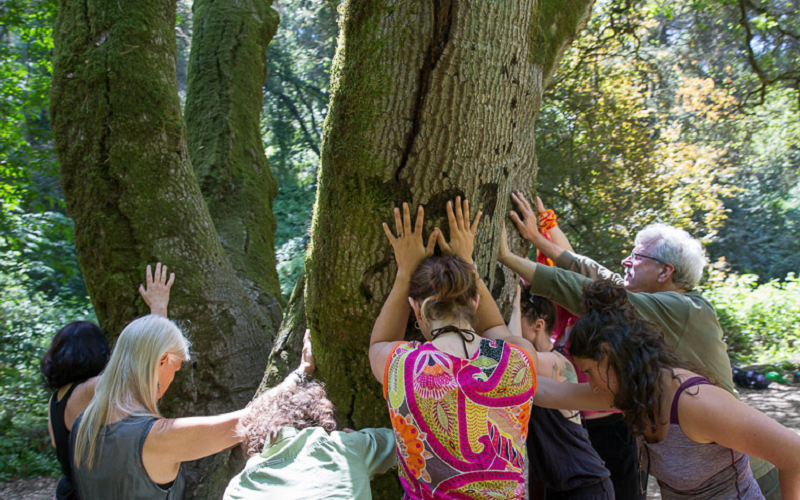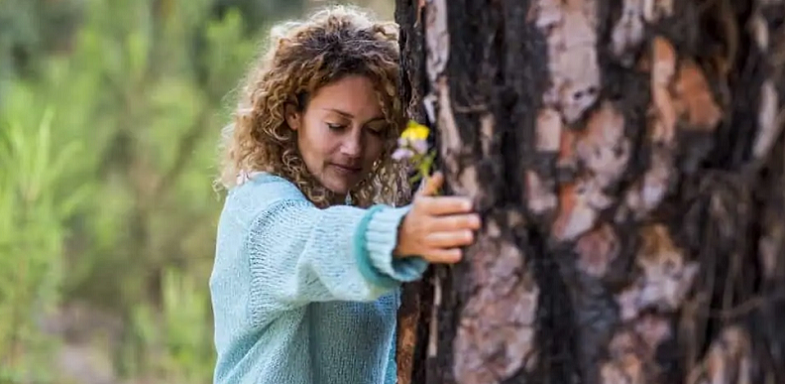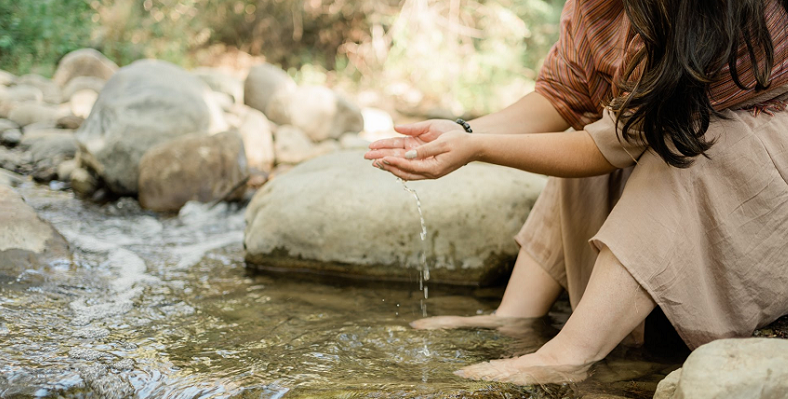
In today’s fast-paced and stressful world, finding peace and solace can be a challenge. However, nature offers a natural remedy that can improve mood and overall well-being. Ecotherapy, a form of therapy that involves spending time in natural environments, has gained popularity as a means of improving mental health. Research has shown that spending time in nature can reduce stress, boost mood, and improve cognitive functioning.
What Is Ecotherapy?
Ecotherapy, also known as nature therapy or green therapy, is a type of therapy that involves spending time in natural environments to improve mental and physical health. Ecotherapy has gained popularity in recent years as a complementary treatment for a range of mental health conditions, including anxiety, depression, and stress-related disorders.
The fundamental principle behind ecotherapy is that nature has a positive impact on our well-being. When we spend time in natural environments, our brain and body respond in ways that promote relaxation, stress reduction, and overall well-being. This is partly because being in nature provides a sensory experience that is different from the sensory overload we experience in modern urban environments.
Numerous studies have shown that exposure to nature can reduce stress and anxiety levels, lower blood pressure, and improve overall mood. Spending time in nature has also been linked to improved cognitive function, including better attention and memory.
Ecotherapy can take many different forms, including horticultural therapy, animal-assisted therapy, forest bathing, and green exercise.

The Science Behind Ecotherapy
The science behind ecotherapy centers around the concept of biophilia, which refers to the human connection to nature. This connection is rooted in our evolutionary history, as humans have spent most of their existence in natural environments. However, in modern times, we have become increasingly disconnected from nature, which can have negative impacts on our mental and physical health.
Numerous studies have shown that spending time in natural environments can have a positive impact on mental and physical health. For example, exposure to nature has been shown to reduce stress and anxiety levels, lower blood pressure, and improve overall mood. Researchers have also found that spending time in nature can improve cognitive function, including attention and memory.
One reason for these positive effects is that being in nature promotes relaxation and reduces stress. Exposure to natural sounds, such as birdsong or the sound of a flowing stream, has been shown to reduce stress hormone levels and increase feelings of calmness. Similarly, exposure to natural environments has been linked to a reduction in the “rumination,” or repetitive negative thoughts, which are common in anxiety and depression.
In addition, being in nature can promote physical activity, which is known to have positive impacts on mental and physical health. Green exercise, which involves physical activity in natural environments, has been shown to improve mood and reduce symptoms of depression and anxiety.
Another way in which nature can promote well-being is through the concept of “attention restoration.” Spending time in natural environments allows our minds to relax and recover from the mental fatigue that can result from the constant stimulation of modern life. This restoration of attention can improve cognitive functioning, including attention and memory.
Being in nature can promote social connections and a sense of community, which are important factors in overall well-being. For example, community gardens and other shared outdoor spaces provide opportunities for social interaction and collaboration, which can promote a sense of belonging and purpose.

The Benefits of Ecotherapy
Ecotherapy has been shown to have numerous benefits for mental and physical health. The following are some of the key benefits.
Improved Mood and Decreased Stress
One of the most well-known benefits of ecotherapy is its ability to improve mood and reduce stress. Being in natural environments has been shown to lower cortisol levels (a stress hormone) and increase feelings of relaxation and calmness. In fact, one study found that just 20 minutes of exposure to nature can lower cortisol levels and improve mood.
Increased Physical Activity and Fitness
Spending time in natural environments can also promote physical activity and fitness. Green exercise, which involves physical activity in natural environments, has been shown to have numerous health benefits, including improved cardiovascular health, decreased obesity, and improved overall fitness. Outdoor activities such as hiking, biking, and kayaking can provide a fun and enjoyable way to stay active.
Improved Cognitive Functioning
Being in nature can also improve cognitive functioning, including attention and memory. Researchers have found that exposure to natural environments can improve concentration and creativity, and can even improve academic performance. The restorative effects of nature can help combat mental fatigue and improve overall cognitive functioning.
Improved Self-Esteem and Sense of Purpose
Ecotherapy can also improve self-esteem and foster a sense of purpose. Horticultural therapy, for example, involves working with plants and gardens to promote physical, mental, and emotional well-being. This type of therapy can provide a sense of accomplishment and purpose, and can improve self-esteem by teaching new skills and providing opportunities for success.
Improved Overall Well-being
Ecotherapy can promote overall well-being by providing opportunities for social connections, promoting relaxation and stress reduction, and providing a sense of connection to nature. This can improve quality of life and promote a sense of happiness and fulfillment.

Types of Ecotherapy
Ecotherapy can take many different forms, and there are several different types of ecotherapy that have been developed to meet different needs and preferences.
Horticultural Therapy
Horticultural therapy involves working with plants and gardens to promote physical, mental, and emotional well-being. This type of therapy is often used in rehabilitation programs, as it provides a hands-on, sensory-rich experience that can improve self-esteem and foster a sense of purpose. Horticultural therapy can involve a range of activities, such as planting and harvesting vegetables, caring for flowers and plants, and landscaping.
Animal-Assisted Therapy
Animal-assisted therapy involves interacting with animals, such as horses, dogs, or cats, to promote relaxation and reduce stress. This type of therapy has been shown to be effective in improving mood and reducing symptoms of anxiety and depression. Animal-assisted therapy can involve a range of activities, such as petting and grooming animals, taking them for walks, and participating in structured activities with them.
Forest Bathing
Forest bathing, also known as Shinrin-yoku, involves spending time in a forest or other natural environment to improve well-being. This type of therapy is rooted in Japanese culture and emphasizes mindfulness and immersion in nature. Forest bathing involves walking or sitting in nature, paying attention to your senses, and taking in the sights, sounds, and smells of the natural environment.
Green Exercise
Green exercise involves physical activity in natural environments, such as hiking, gardening, or outdoor yoga. This type of therapy combines the benefits of exercise with the stress-reducing effects of nature. Green exercise has been shown to improve mood, reduce symptoms of depression and anxiety, and improve overall fitness and cardiovascular health.
Tips for Incorporating Ecotherapy into Your Life
Incorporating ecotherapy into your life can be a simple and enjoyable way to improve your mental and physical well-being.
Start Small
If you’re new to ecotherapy, it’s important to start small and gradually build up your exposure to nature. Begin by taking a short walk in a park or spending time in your backyard. As you become more comfortable, you can gradually increase the amount of time you spend in natural environments.
Find the Right Setting
When incorporating ecotherapy into your life, you should find the right setting for you. Some people prefer quiet, secluded natural environments, while others prefer more social settings, such as community gardens or parks. Experiment with different settings to find what works best for you.
Engage All Five Senses
To fully immerse yourself in nature and get the most out of ecotherapy, engage all five senses. Take in the sights, sounds, smells, textures, and tastes of the natural environment. This can help you feel more connected to nature and promote relaxation and stress reduction.
Practice Mindfulness
Ecotherapy can be a form of mindfulness practice, as it encourages you to be present in the moment and fully engage with your surroundings. Practice mindfulness by paying attention to your thoughts, feelings, and bodily sensations as you spend time in nature. This can help you become more grounded and centered, and can improve overall well-being.
Incorporate Ecotherapy into Your Daily Routine
To get the most out of ecotherapy, try to incorporate it into your daily routine. This could mean taking a walk in a park during your lunch break, spending time in a community garden after work, or doing outdoor yoga in your backyard. By making ecotherapy a regular part of your routine, you can experience its numerous benefits on a consistent basis.
Ecotherapy and Sustainability
Ecotherapy not only provides numerous benefits for mental and physical well-being, but it can also promote sustainability and environmental conservation.
Connection to Nature
Ecotherapy can help foster a deeper connection to nature, which can promote a greater sense of responsibility and stewardship toward the environment. By spending time in natural environments, we can become more aware of the beauty and complexity of the natural world, and can develop a deeper sense of connection to it.
Education and Awareness
Ecotherapy can also promote education and awareness about environmental issues. For example, horticultural therapy can provide opportunities to learn about sustainable gardening practices and composting, while forest bathing can provide opportunities to learn about local flora and fauna. By raising awareness and promoting education, ecotherapy can help individuals become more informed and responsible environmental stewards.
Sustainable Practices
Many forms of ecotherapy, such as horticultural therapy and green exercise, involve practices that are inherently sustainable. For example, organic gardening practices can promote healthy soil and reduce the use of harmful pesticides and fertilizers, while green exercise involves physical activity in natural environments that does not require the use of electricity or other resources. By practicing sustainable ecotherapy, individuals can reduce their environmental impact and promote sustainability.
Advocacy
Ecotherapy can also inspire individuals to become advocates for environmental conservation and sustainability. By fostering a deeper connection to nature and raising awareness about environmental issues, ecotherapy can inspire individuals to take action to protect the natural world.
